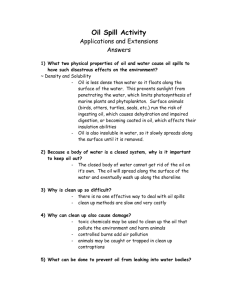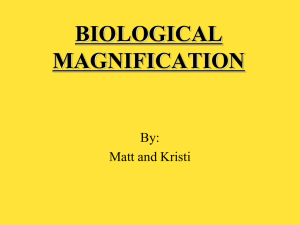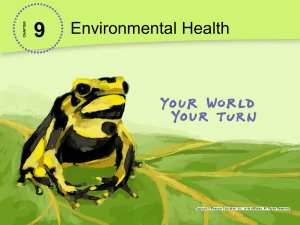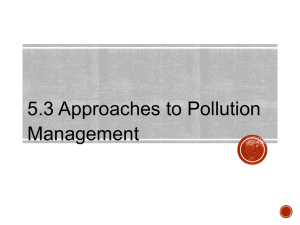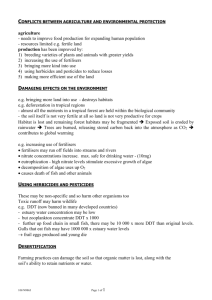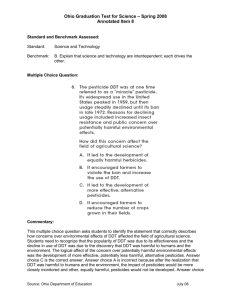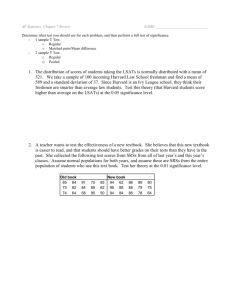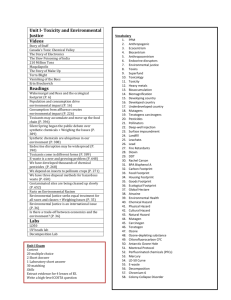Congress of Racial Equality – PowerPoint presentation
advertisement
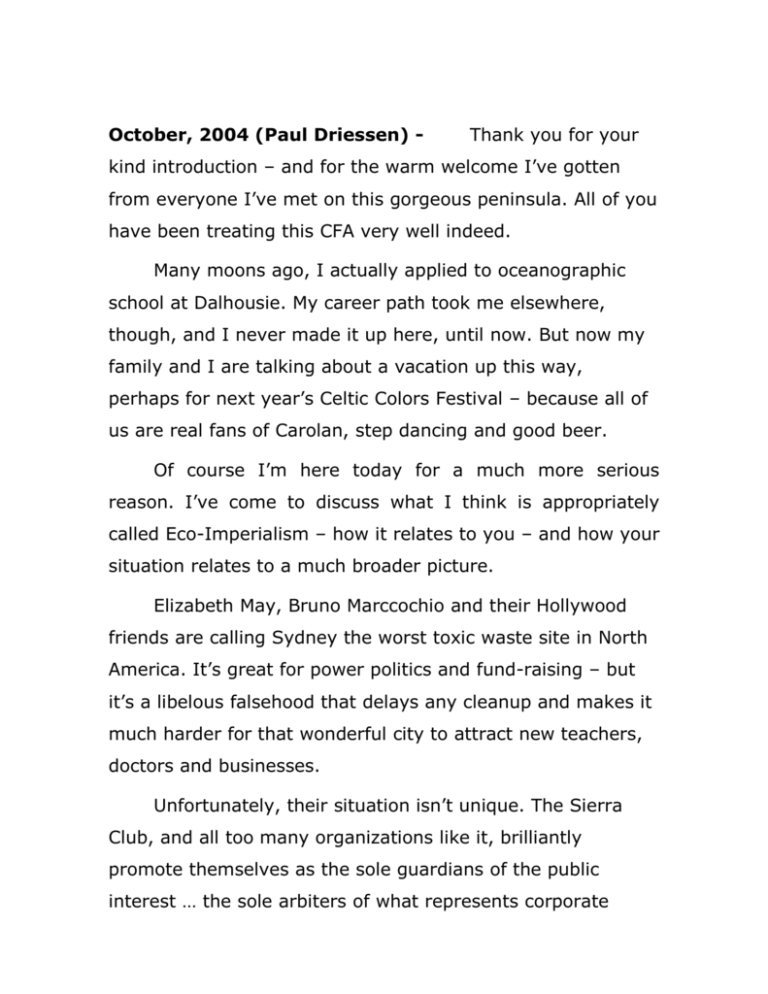
October, 2004 (Paul Driessen) - Thank you for your kind introduction – and for the warm welcome I’ve gotten from everyone I’ve met on this gorgeous peninsula. All of you have been treating this CFA very well indeed. Many moons ago, I actually applied to oceanographic school at Dalhousie. My career path took me elsewhere, though, and I never made it up here, until now. But now my family and I are talking about a vacation up this way, perhaps for next year’s Celtic Colors Festival – because all of us are real fans of Carolan, step dancing and good beer. Of course I’m here today for a much more serious reason. I’ve come to discuss what I think is appropriately called Eco-Imperialism – how it relates to you – and how your situation relates to a much broader picture. Elizabeth May, Bruno Marccochio and their Hollywood friends are calling Sydney the worst toxic waste site in North America. It’s great for power politics and fund-raising – but it’s a libelous falsehood that delays any cleanup and makes it much harder for that wonderful city to attract new teachers, doctors and businesses. Unfortunately, their situation isn’t unique. The Sierra Club, and all too many organizations like it, brilliantly promote themselves as the sole guardians of the public interest … the sole arbiters of what represents corporate social responsibility … the only ones truly concerned about ethics, and the health and welfare of people, communities and the environment. They’ve also transformed what was once a mostly pragmatic, grassroots environmental movement into a huge, multinational, multi-billion-dollar crisis creation and perpetuation industry. Its ethics and honesty are often questionable. Its quest for ever more layers of red tape is driving both rural cleansing and a growing rural revolution. Its selfcontradictory (one could say hypocritical) policies have become the stuff of legend. Bemoan over-fishing of wild stocks, but oppose Paul Driessen addressing the breakfast in Halifax. aquaculture. Champion small farmers, and then suffocate them with regulations. Oppose timber cutting – and then stand mute when millions of acres burn in monstrous infernos that destroy habitats, wildlife, soils, streams, homes … and people’s livelihoods and lives. 2 Its funding and dealings are hardly transparent. Its policies cause endless suffering for millions of poor people. And for the most part it is unaccountable to anyone. Am I’m being too harsh? Listen to what Canada’s own, Greenpeace co-founder Patrick Moore, has to say about the movement he helped put on the map. He repeatedly calls it intellectually and morally bankrupt – and he condemns it for its anti-science, anti-technology, anti-civilization, and antipeople ideologies. So the good news – and bad news – is: You folks aren’t alone in having to confront problems that are made even worse by organizations whose mindsets, agendas and ethics are quite different from your own. Other people, in fact, face infinitely worse situations. ECO-IMPERIALISM 1. As Milton Friedman likes to say, there is no such thing as a free lunch – not in economics, and not in the arena of environmental policies. The only questions are: Who pays for environmental purity? How much do they pay? And who gets to decide? My book, and my talk today, address what I believe are the unethical, and unsustainable consequences of imposing the 3 agendas of well-off activists in the United States and Europe on the world’s most impoverished people. 2. These powerless people are too often forced to pay a terrible price for what I call ideological environmentalism, or Eco-Imperialism. That price is measured in perpetual poverty, human rights violations, and lost lives – literally MILLIONS of lives, every year. It’s unconscionable. It reflects the false ethics and ecocentric ideologies that dominate far too many debates about the environment and corporate social responsibility. It must not continue. 3. As the song from Disney’s Lion King says, there is a circle of life. If people are to be healthy and prosperous, they need electricity, disease prevention, clean water and nutrition. All are essential, and all are inter-connected. 4. But just as there is a circle of life, there is also a circle of death. It connects policies that perpetuate poverty, disease, malnutrition and early death – and will continue to do so as long as ideological environmentalists are allowed to dictate choices for the developing world. 4 Far too many of these organizations oppose electrical generation, economic development, biotechnology and pesticides, especially DDT. In so doing, they deprive destitute people of the blessings we take for granted – while doing little to safeguard the environmental values we all cherish. ELECTRICITY 5. A lot of Americans along the East Coast got a rude reminder of what life is like without electricity, when Hurricane Isabel struck last year. Schools, offices, factories, even water purification plants shut down. Lights, computers, telephones, stoves, refrigerators, air conditioning were all out of commission. Millions of dollars worth of food got thrown out. We had no drinking water. No hot water for showers and baths. Worst of all, no television! 6. Isabel also reminded us what life is like every single day for 2 billion people who never have electricity. In Uganda and other parts of Africa, less than 3 percent of the population has access to electricity. 5 In much of India, China, Central Asia and Latin America, the deprivation is nearly as bad. People there never enjoy any of the conveniences we take for granted. 7. In developing countries around the world, in an era when the average European cow is subsidized to the Paul Driessen takes questions after his Sydney talk as Brian Lee Crowley looks on. tune of $250 a year, a billion people struggle to survive on less than $200 per year. Three billion people – half the world’s population – live on less than $700 a year. 8. Life for these people would be infinitely better if they simply had abundant, reliable, affordable electricity. For lights 6 and refrigeration in their homes. Hospitals and clinics. Schools, shops and factories. Water purification and sewage treatment. The terrible reality is that, without electricity, the world’s poorest people will never have any of these things, or the healthcare, nutrition and prosperity that we view as our birthright. 9. Unfortunately, they’re not likely to get electricity anytime soon, because wealthy, powerful environmental pressure groups oppose electricity. They’re part of an 8-billion-dollara-year global industry, and their comments often betray what can only be called a callous, paternalistic, eco-centric attitude. 10. Friends of the Earth president Brent Blackwelder: “It’s just not possible for people to have the material lifestyle of the average American. I’m proud that we’ve blocked over 300 hydroelectric projects in developing countries.” 11. Earth Island Institute editor Gar Smith: “African villagers used to spend their days and evenings sewing clothing for their neighbors, on foot-peddle-powered sewing machines. 7 “Once they get electricity, they spend too much time watching television and listening to the radio. If there is going to be electricity, I’d like it to be decentralized, small and solar-powered.” 12. Actor Ed Begley, Jr: “I would promote solar and wind for power, not damming more rivers. It’s much cheaper for everybody in Africa to have electricity where they need it – on their huts.” Little solar panels on huts – and huts forever. Keep the locals cute, indigenous, traditional – and impoverished – just like their ancestors, for another hundred years. 13. So, instead of switching on a light or appliance, millions of mothers and daughters will continue spending hours every day collecting firewood – or squatting in mud reeking with animal feces and urine, to collect, dry and store manure for cooking and heating fires. 14. Instead of turning a faucet handle, millions will continue spending countless more hours carrying water from distant rivers and lakes, often miles away, and often tainted with parasites and bacteria. 8 15. Instead of enjoying a modern kitchen, they will continue spending hours a day over primitive hearths, constantly breathing polluted smoke from their fires. 16. Instead of going to school, their children will continue washing the family laundry in the river, tending crops and cattle, weaving carpets or picking through trash, to help put food on the table. 17. The human health, economic and environmental impacts are horrendous. Four million infants, children and mothers die every year from asthma, pneumonia, tuberculosis and other lung infections – caused by breathing the AIMS’ Board member, Jacquelyn Thayer Scott with Paul Driessen and Brian Lee Crowley in Sydney. smoke, dust, bacteria and pollutants that are a constant fixture in their homes and throughout their villages. 9 Six million more perish every year from dysentery and other intestinal diseases, caused by unsafe water and spoiled food. Few are lucky enough even to get cancer, much less die from it. They simply won’t live long enough for that. 18. And still, radical environmentalists claim that they are “stakeholders,” who have a right to make decisions that affect these people’s lives, by determining what is in “the public interest.” 19. These eco-imperialists insist that ‘renewable energy’ and ‘clean development’ are the future for Third World countries, says India’s Barun Mitra. This, they argue, represents environmental ethics, sustainable development, and prudent precaution to prevent global climate change and other hypothetical risks. DELAY NEXT SLIDE 20. However, it is groups like the Sierra Club, Greenpeace and NRDC who define these terms, decide which risks should be addressed, and determine who pays the price. Their antidevelopment agendas focus on distant, conjectural, imagined risks. They show little regard for the very real, immediate, lifethreatening risks that the world’s poor face every day. 10 These people want better lives, a chance to see their children live past infancy. Few of them are thrilled by the ecoimperialists’ assertions that they simply want to “protect” “traditional” life styles. 21. “Cute, indigenous customs aren’t so charming when they make up one’s day-to-day existence,” says Kenya’s Akinyi Arunga. “Then they mean indigenous poverty, indigenous malnutrition, indigenous disease and childhood death. I don’t wish this on my worst enemy, and I wish our so-called friends would stop imposing it on us.” 22. Opposition to these energy projects is “a crime against humanity,” a man in Gujarat, India angrily told a television news crew. “We don’t want to be encased like a museum,” a Gujarati woman told the crew, in primitive lifestyles so romanticized by Hollywood and radical Greens. 23. Blocking the construction of centralized power projects, as not being “appropriate” or “sustainable,” condemns billions of people to sustained poverty and disease – and millions to premature death. 11 It may reflect the activists’ “passion for the environment.” But it hardly reflects concern for the poor – and it’s hardly moral, ethical or socially responsible. 24. Ironically, anti-energy policies also harm the environment. “People cut down our trees, because they don’t have Community and business leaders gathered in Sydney to hear Paul Driessen’s message about the dangers of unaccountable environmental extremism. electricity,” Uganda’s Gordon Mwesigye points out, “and our country loses its wildlife habitats, and the health and economic benefits that abundant electricity brings.” 25. It’s pure fantasy to suppose that solar panels or wind turbine farms can produce as much electricity as gas, coal, 12 hydroelectric or nuclear generating plants – enough for a modern society. It’s just as illusory to claim renewable energy is ecologically preferable to fossil fuel plants. A single 555megawatt gas-fired power plant generates more electricity in a year than do all 13,000 wind turbines in California. 26. The gas-fired plant uses a mere 15 acres. The 300-foottall windmills impact 106,000 acres, destroy scenic vistas, and kill thousands of birds and bats every year – to provide expensive, tax-subsidized, intermittent, insufficient energy. And you still need gas-fired power plants, as backup every time the wind stops blowing. 27. South Africa’s Leon Louw accurately sums up the reaction of many poor people to these anti-electricity policies: “Telling destitute people they must never aspire to living standards much better than they have now – because it wouldn’t be ‘sustainable’ – is just one example of the hypocrisy we have had thrust in our faces, in an era when we can and should grow fast enough to become fully developed in a single generation. We’re fed up with it.” 13 Unfortunately, depriving people of all the benefits that electricity brings is not the only human rights violation committed in the name of preserving the environment. Let’s look at Patrick Moore’s hot-button issue: biotechnology. BIOTECHNOLOGY 28. Nearly 14 million people face starvation in southern Africa alone. Worldwide, 800 million are chronically undernourished. Some 740 million people go to bed every night on empty stomachs – and nearly 30,000 (half of them children) die every single day from malnutrition and starvation. 29. Over 200 million children suffer from Vitamin A Deficiency. Up to 500,000 of them go blind from it every year – and 2 million a year die from malaria, dysentery and other diseases they would survive, if they weren’t so malnourished and had so little vitamin A in their bodies. 30. Biotechnology could fortify plants with vitamins, to reduce malnutrition and blindness. Genetically engineered Golden Rice is rich in beta-carotene, which humans can convert to vitamin A, to prevent blindness and save lives. Just 200 14 grams a day will suffice – not the 2 kilograms a day that antibiotech radicals claim they would need. (2 oz – 4 lb) 31. Genetic engineering can also produce plants that can grow better in saline and nutrient-poor soils … fight off insects and viruses … Replace crops devastated by disease and drought … reduce allergens … and even produce vaccines against diseases like hepatitis. Biotechnology can also increase the shelf-life for foods (even without refrigeration), and eliminate dangerous fungal contamination, like aflatoxin, the most potent carcinogen known to man. (1 ppb) 32. By increasing crop yields, gene-spliced plants can help farmers in developing countries earn a decent living, build a real house … and compete better with European and American farmers, who get over $300 billion a year in subsidies. Poor countries would be able to grow more nutritious food, and more of it, to feed their hungry people. But they’d need fewer people to work the fields – so more people would be able to do other work, and generate greater prosperity for poor families, communities and nations. 15 33. Biotech crops also reduce soil erosion, by allowing farmers to use herbicide-resistant plants and no-till farming methods. And they typically need fewer fertilizers, fewer pesticides and less water – important considerations in poor, arid regions. 34. Biotechnology also saves wildlife habitats. If we had tried to produce as much food as we did in 2000 using the agricultural technologies of the 1960s – says Dr. Norman Borlaug, Nobel Prize winning father of the first Green Revolution – we would have had to DOUBLE the amount of land under cultivation. Where would this land have come from? Farmers would have plowed under millions of acres of forests, grasslands and scenic areas all over the world. And millions of starving people would have been forced to hunt and cook virtually anything that swims, runs, crawls or flies. 35. Modern biotech methods are precise, predictable refinements of plant breeding techniques that have been used for centuries. They’re safe for people and planet. 16 I’ve been eating GM foods for years. In fact, Americans have collectively consumed more than a TRILLION servings of food containing gene-spliced ingredients – without a single mishap that resulted in injury to a person or ecosystem. But none of this seems to matter to radical greens. 36. Greenpeace claims genespliced organisms “pose unacceptable risks to ecosystems and have the potential to threaten Peter Dwyer speaks with Paul Driessen prior to the Halifax talk. biodiversity, wildlife and sustainable forms of agriculture.” Professional worrier Jeremy Rifkin rants that biotechnology threatens “a form of annihilation every bit as deadly as nuclear holocaust.” Sierra Club wants a moratorium on all GE crops – “including those already approved.” 17 People are starving and dying, and these organizations are talking about far-fetched, hypothetical risks to the environment – and then claiming they’re moral and ethical for doing so. 37. “I appreciate ethical concerns,” Kenyan plant biologist Florence Wambugu remarks. “But anything that doesn’t help feed our children is unethical.” We wouldn’t stop using penicillin just because it causes allergic reactions in a few people, she points out. We wouldn’t stop driving our cars or crossing the street, despite the obvious risks. And we shouldn’t ban genetically engineered crops, just because vocal activists raise speculative safety concerns. 38. Nor should we allow them to foment fear about food aid, on the ground that some of the grain might be genetically modified. But they did exactly that in 2002, when the United States sent Zambia 26,000 tons of corn – the same delicious corn that millions of Americans have been eating safely for years. Radical Greens spread rumors that the corn was poisonous, and might cause cancer, or even AIDS. So it got 18 locked up in warehouses, while children starved – until desperate people broke into the warehouses, and simply took the corn. 39. A man was asked, wasn’t he concerned that the corn might make him sick? Reflecting the lies he’d been hearing, he told the news crew: “If I eat the corn, maybe I’ll get sick and die in a few years. But if I don’t eat it, I will die tomorrow.” 40. Even when starving people want to plant diseaseresistant GM crops only to feed themselves, anti-biotech zealots shriek “Frankenfoods” and “genetic pollution.” Meanwhile, well-fed European bureaucrats threaten to ban the import of crops from any nation that dares to defy their anti-biotech edicts, by planting disease-resistant bananas, corn and sweet potatoes for consumption by their own inhabitants. Hassan Adamu is right: “To deny desperate, hungry people the means to control their future, by presuming to know what is best for them, is not only paternalistic. It is morally wrong. The harsh reality is that, without the help of agricultural biotechnology, many will not live.” 19 41. Activists claim the malnutrition, disease and death isn’t their intent. However, it is the result – and the result is certainly predictable. They simply ignore, or deny, the very real likely consequences, and do absolutely nothing to alter their anti-biotech campaigns. 42. In fact, according to the Wall Street Journal, they intend to spend $175 million battling biotech foods between 2002 and 2006 – on top of the $500 million they spent between 1995 and 2001, courtesy of “socially responsible” foundations, governments and organic food companies. The director of Uganda’s banana research program has been blunt in his outrage. “The Europeans have the luxury to delay,” he said. “They have enough to eat. But we Africans don’t.” 43. Dr. Borlaug, puts it this way: “There are 6 billion people on the planet today. With organic farming, we could only feed 4 billion of them. Which 2 billion would volunteer to die?” A more accurate question might be: Which 2 billion would Greenpeace and the Sierra Club – and foundations like Pew, Ford, MacArthur and Packard – “volunteer” to die? 20 MALARIA 44. This intolerable situation brings us to an even worse ethical outrage – my personal hot-button issue: policies that make millions of poor people get sick and die every year from malaria. In fact, almost nothing impacts African lives the way malaria does. Not dysentery, not tuberculosis, not malnutrition or typhus. Not even AIDS. 45. “I’ve suffered high fevers for days, vomited until I thought I had no stomach left,” Ugandan farmer and businesswoman Fifi Kobusingye told me. “It has left me dehydrated, thirsty and weak. And sometimes I couldn’t even tell day from night.” 46. “My friend’s little child hasn’t been able to walk for months because of malaria,” Fifi said. “She crawls around on the floor. Her eyes bulge out like a chameleon, her hair AIMS’ Board member, George Cooper discusses the negative effects of the DDT ban during the talk 21 in Halifax. is dried up, and her stomach is all swollen because the parasites have taken over her liver. Her family doesn’t have the money to help her, and neither does the Ugandan government. All they can do is take care of her the best they can, and wait for her to die.” The horror of this tragedy is incomprehensible. 47. Malaria infects 300,000,000 people a year – ten times the population of Canada. It kills 2,000,000 every year – twice the population of Ottawa. The vast majority are in subSaharan Africa, and nearly 90 percent of them are children and pregnant women. As Fifi says: You just can’t imagine. 48. Those victims the disease does not kill, it leaves so weak that they cannot work, go to school, care for their families or cultivate their fields – often for weeks on end. Malaria leaves other people with severe brain damage – or makes them so weak that they die of AIDS, typhus, dysentery or other serial killer diseases that stalk these lands. 22 49. It’s no wonder that central Africa, where malaria is most prevalent, is also the most destitute region on this impoverished continent. How is this possible, in this age of pesticides and wonder drugs? 50. It happens in large part because those same environmental extremists – along with the World Health Organization, UNICEF, wealthy foundations and the U.S. Agency for International Development – tell these desperate countries that they must rely on bed nets and drug therapies, and must never use pesticides, especially DDT. Use DDT or other pesticides, rich countries say, and we will cut off your funding for other healthcare programs. We’ll ban your tobacco and other farm products, if we find even a tiny trace of DDT on them. Yes, the US Environmental Protection Agency banned DDT in 1972. But it did so primarily for political reasons, in response to Rachel Carson’s book Silent Spring, and an unrelenting campaign by Environmental Defense and the same people who later concocted the Alar-and-apples scare: the Natural Resources Defense Council. 23 Moreover, it did so AFTER we had used DDT and other pesticides to eliminate malaria in the United States, Canada and Europe. 51. So today, American and European activists can afford to oppose DDT. They live in wealthy, malaria-free societies – where we still use pesticides to protect people against diseases like West Nile virus, which has killed about 300 Americans over the past three years. But their inhumane anti-pesticide policies against poor countries mean hundreds of thousands of children and parents die every year who would live, if their countries could also use DDT. [malaria kills an African child every 30 seconds] 52. In fact, since 1972, at least 50 million people have died from malaria. Heaven knows how many might have lived, if their countries had been able to use DDT – how many might have become the next Nelson Mandela, Florence Wambugu, or George Washington Carver. 53. Sprayed in tiny amounts on walls of homes, this inexpensive miracle pesticide repels mosquitoes for six months or more. It kills any that land on the walls, and 24 disorients those it does not kill or repel, so they don’t bite. Almost no other pesticides have this triple action feature. Where DDT is used, malaria cases and deaths plummet. Where it is not used, they skyrocket. South Africa learned this the hard way. 54. After using DDT to slash malaria disease and death rates, the country got complacent. It bowed to environmentalist pressure, and stopped using DDT. Within just a couple years, malaria skyrocketed from a few thousand cases a year to nearly 70,000! So South Africa reintroduced DDT, for indoor residual spraying. A year later, it added ArtemesininPaul Driessen expands on the benefits of South Africa’s decision to reintroduce DDT during the question period in Halifax. based Combination 25 Therapy (or ACT) drugs to the program. In just three years, it cut malaria rates by over 90 percent! Hundreds of people lived, who would have died. South Africa population = 35 million 60,000 = 0.2% (much higher in Uganda) Africa’s richest, most developed country needed DDT – other nations clearly need it USA comparable to South Africa: 536,000 cases / yr USA comparable to sub-Saharan Africa: 100 million cases and 500,000+ deaths Healthcare system overwhelmed – we wouldn’t tolerate being told not to use DDT 55. Despite vocal claims to the contrary, DDT is not carcinogenic or harmful to humans. Poor nations can afford it. Used properly, it’s safe for the environment. And malaria-carrying mosquitoes are far less likely to build immunities to DDT than to other pesticides, which are still used heavily in agriculture. 56. But Greenpeace, the Pesticide Action Network, NRDC, Physicians for Social Responsibility, WHO and USAID still oppose DDT. 26 Perhaps even worse, the WHO, USAID, UNICEF and Roll Back Malaria have continued to promote, prescribe and provide anti-malarial drugs that they have known for years are no longer effective in treating this killer disease. In fact, they fail 50 to 80 percent of the time! That’s flagrant medical malpractice, in my opinion. But mention DDT, and all they want to talk about is traces of DDT in mother’s breast milk, and theoretical harm to crocodiles or birds. 57. Fifi has a simple answer for them: “I lost my son, two sisters and two nephews to malaria. Don’t talk to me about birds. “And don’t tell me a little DDT in our bodies is worse than the risk of losing more children to this disease. African mothers would be overjoyed if that were their biggest worry.” 58. What drives these anti-pesticide policies? Putting environmental values ahead of everything else is one factor. Another is a fear of chemicals that borders on the pathological. But another may be their callous belief that the world has too many people. Developing countries would be better off, said one USAID worker, if people were “sick with malaria and spread 27 the job opportunities around. In fact, people in the Third World would be much better off dead than alive, and riotously reproducing.” 59. Maybe banning DDT would cause a lot of deaths, Environmental Defense scientist Charles Wurster once remarked. “So what? People are the cause of all the problems. We have too many of them, and banning DDT is as good a way to get rid of some of them as any.” “To stabilize world populations,” Jacques Cousteau told a French magazine in 1991, “we must eliminate 350,000 people a day.” And Club of Rome founder Alexander King once wrote: “My chief quarrel with DDT is that it has greatly added to the population problem.” 60. To their everlasting credit, many other people have taken a far more humanitarian and ethical position. The New York Times said in a strongly-worded editorial: the developed world “has been unconscionably stingy in financing the fight against malaria or research into alternatives to DDT. Until one is found, wealthy nations should be helping poor countries with all available means – including DDT.” (December 22, 2002) 28 61. “There is no charitable way to put it,” said the Washington Times. “Children are dying, while Westerners worry about fictitious environmental effects. Aid agencies need to drop their opposition to the use of DDT in Africa and encourage the countries now considering using it, to do so.” (April 17, 2004) 62. Jurassic Park author (and PhD molecular biologist) Michael Crichton is even more blunt: “Banning DDT is one of the most disgraceful episodes in the twentieth century history of America. “We knew better, and we did it anyway, and we let people around the world die, and we didn’t give a damn.” (September 2003) DDT is certainly not some magical potion that – all by itself – can wipe out malaria, and bring health and prosperity to Africa and other countries where this killer disease is still epidemic. But it is a vital weapon in the war against a disease that is constantly mutating, is carried by many species of mosquitoes, and exists under varied conditions in different countries and even different regions of the same country. 63. For environmentalists and their allies to force people to suffer and die – by telling them they must never use DDT and 29 other pesticides – is a moral outrage that we must challenge with every ounce of our being. WRAPPING IT UP 64. What it all comes down to is this. Environmental activists who’ve never known starvation, never had to live without electricity, never had to watch their children die of malaria or dysentery, must no longer be allowed to put their anxieties and agendas ahead of the desperate pleas – the most basic needs – of destitute people who wish only to improve their lives, and save their children’s lives. That’s why it’s vital to change the focus and terminology of the environmental debate – and ensure that these vital ethical and human rights issues become a central part of every public policy discussion. 65. Greenpeace co-founder Patrick Moore is correct. “The environmental movement has lost its objectivity, morality and humanity. The pain and suffering it is inflicting on families in developing countries must no longer be tolerated.” 66. As Rabbi Daniel Lapin has put it – these families must be allowed, encouraged and helped to take their rightful places among the Earth’s prosperous, and healthy, people. 30 They need sustained development – not “sustainable development.” They need a precautionary principle that safeguards them from real, immediate, life-threatening risks – instead of condemning them to poverty, misery and premature death, to prevent risks associated with conjectural, or concocted, eco-catastrophes. 67. Simply put, opposition to energy development projects, biotechnology, pesticides and prosperity is callous EcoImperialism. It’s unnecessary, because most of the supposed environmental “crises” are minor, hypothetical or even imaginary. It certainly is not ethical, socially responsible or compassionate. Worst of all, it’s lethal. It’s callous eco-manslaughter, at the hands of environmental pressure groups. If you confront the claims and agendas of environmental activists … help educate others about the harmful effects of eco-imperialism … and promote more ethical and humane policies – you will help bring a measure of hope, life and prosperity to people who long to have just a few of the many blessings we take for granted. 31 68. Niger Innis, national spokesman for the Congress of Racial Equality, puts it this way: “There is no more basic human right than to live. Saving, sustaining and improving lives is the most fundamental form of environmental justice and corporate social responsibility. We all want to protect the environment. But we must stop trying to protect it from distant or imaginary threats. We must stop trying to protect it on the backs, and the graves, of the world’s most powerless and destitute people.” 69. I'm glad you are here to take up the challenge – and put honesty, ethics, human rights and basic humanity back into the environmental debate. To make regulations and restrictions commensurate with the actual risks. To ensure that risks to people, communities and businesses – from doing or not doing something – are considered just as carefully as the risks to environmental values. And to insist that “environmental ethics” and “corporate social responsibility” reflect the needs and concerns of people who have to live with, and pay for, the political decisions – both here in Nova Scotia, and in Third World countries. Thanks for coming, and thanks for listening. 32
